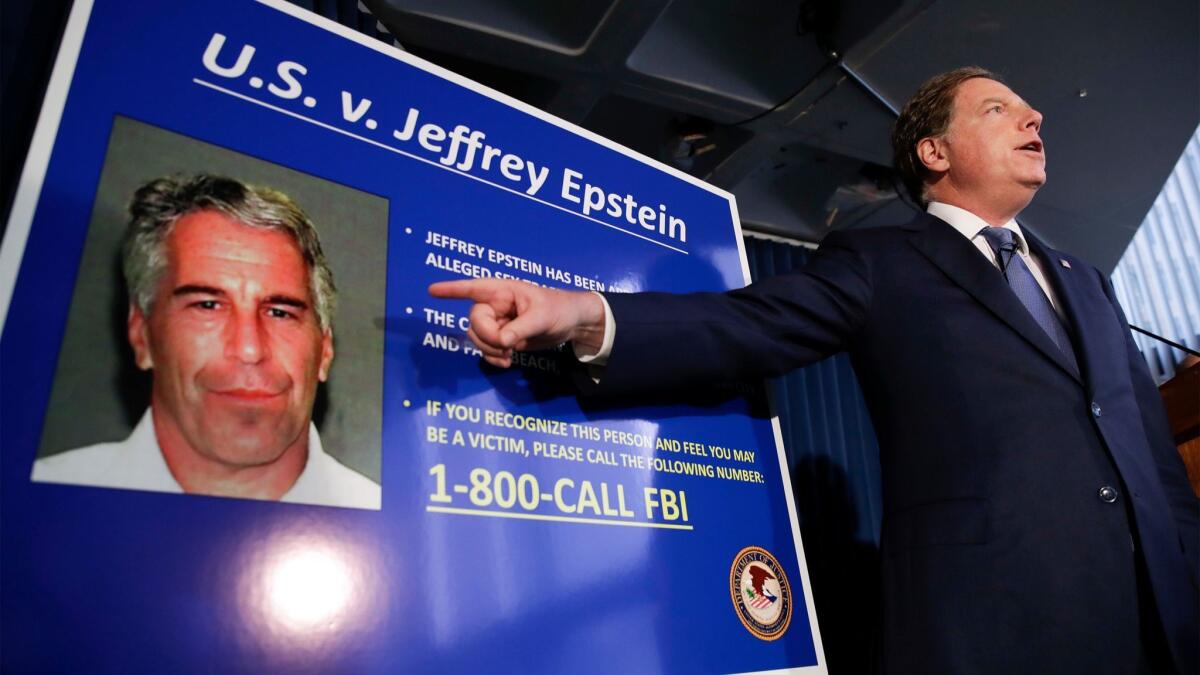Editorial: A prosecutor who investigated Trump’s friends is suddenly out of a job

- Share via
Atty. Gen. William Barr’s abrupt decision to remove a prosecutor who had overseen investigations into President Trump’s allies understandably has aroused alarm about the politicization of the administration of justice. It demands investigation by Congress and the Justice Department’s inspector general.
On Friday, Barr announced that Geoffrey Berman, who was appointed U.S. attorney for the Southern District of New York by a federal court, was “stepping down” and that Trump would nominate Jay Clayton, chairman of the Securities and Exchange Commission, to the position. Meanwhile, Barr said, the Manhattan office would be headed by Craig Carpenito, the U.S. attorney in New Jersey.
A defiant Berman protested that he hadn’t resigned and would remain in office until the Senate confirmed his successor. Until then, Berman said, “our investigations will move forward without delay or interruption.” The obvious inference was that the attempt to dismiss Berman threatened those investigations, which reportedly include a probe of Rudolph W. Giuliani, Trump’s personal lawyer.
Barr announced the next day that Trump had fired Berman but that the office would temporarily be run by Audrey Strauss, a respected prosecutor who played a key role in the prosecution of Michael Cohen, Trump’s former lawyer and “fixer.” Berman then agreed to leave office. Meanwhile, Sen. Lindsey Graham (R-S.C.), the chairman of the Senate Judiciary Committee, indicated that it was unlikely that the Senate would act on Clayton’s nomination if it were opposed by New York’s two Democratic senators.
But this is not necessarily a case of “all’s well that ends well.” Strauss could be removed in the future. And there remain legitimate questions about why Barr suddenly moved to oust Berman, especially given Barr’s history of taking actions that benefited Trump and his friends. They include the attorney general’s misleading characterization of Special Counsel Robert S. Mueller III’s conclusions about the Russia investigation, his intervention to soften a sentencing recommendation for Roger Stone and the Justice Department’s effort to exculpate Michael Flynn.
Benign explanations have been offered for Barr’s move against Berman, including that his primary motivation was to install Clayton in the Manhattan position. But as Berman noted, he could have remained in charge while the Senate considered Clayton’s nomination. The Wall Street Journal reported that Berman’s removal might have been related to his refusal to sign a letter criticizing New York Mayor Bill de Blasio for COVID-19 social distancing rules that supposedly treated religious gatherings differently from street protests. (A Justice Department spokeswoman insisted that Barr didn’t know that Berman did not sign the letter, and that the letter played no role in the decision to remove Berman.)
Senate Minority Leader Charles E. Schumer (D-N.Y.) has called for Berman’s firing to be investigated by the Senate Judiciary Committee as well as the Justice Department’s Office of the Inspector General and Office of Professional Responsibility. The latter two offices investigated the firing of nine U.S. attorneys during the George W. Bush administration. Meanwhile, House Judiciary Committee Chairman Jerrold Nadler (D-N.Y.) has pledged to conduct his own inquiry, saying the firing fit into a pattern by Trump and Barr of interfering with investigations.
To Barr’s credit, his letter to Berman rejected the implication that Berman’s departure would jeopardize the appropriate handling of pending cases in the Southern District. The attorney general added that he had authorized Inspector General Michael Horowitz to investigate any future claim of improper interference.
But given all that has come before in this administration and especially in Barr’s tenure, that’s just not enough. The inspector general, and Congress, must also scrutinize the decision to remove Berman. When it comes to the impartial administration of justice, this administration can’t credibly claim the benefit of the doubt.
More to Read
A cure for the common opinion
Get thought-provoking perspectives with our weekly newsletter.
You may occasionally receive promotional content from the Los Angeles Times.










